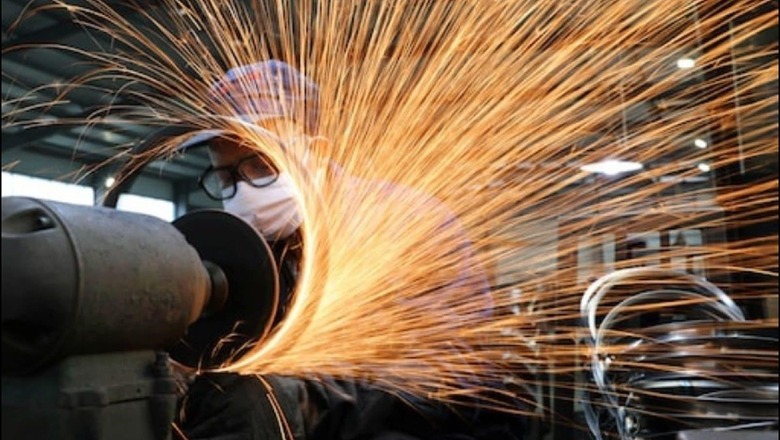
views
PM Narendra Modi today launched the much awaited vehicle scrappage policy in India today. PM Modi launched the policy at the Gujarat Investor Summit and has requested youth & start-ups to join this programme. Vehicle scrapping will help phase out unfit and polluting vehicles in an environment friendly manner, he said. PM Modi also mentioned that the govt aims to create a viable circular economy and bring value for all stakeholders while being environmentally responsible.
The government expects to generate employment for about 35,000 people at vehicle fitness centres and scrapyards and a collective investment of Rs 10,000 crore. The vehicle fitness test cost will depend on the type of vehicle. For a personal vehicle, it will cost Rs 300-400, while for a commercial vehicle it could be Rs 1,000-1,500.
On the other hand, the vehicle scrappage policy is likely to give a major boost to the metal recycling business, said Grant Thornton Bharat. The report also said that the policy is likely to affect major changes in the Indian automotive industry.
Arindam Guha, Partner & Leader, Government & Public Services, Deloitte India has listed down few pointers highlighting how the Vehicle Scrappage Policy can push the Indian economy at large, and not just the automotive sector in the country.
Reduced pollution
Much like the western countries, the scrappage policy comes into effect when a vehicle’s registration is complete. In general, a passenger vehicle has a life of 15 years and a commercial vehicle has a life of 10 years, after which they become obsolete and also starts polluting the environment at a greater intensity than they would have been doing earlier. Pulling out these polluting vehicles from road will help India reduce its carbon footprint, which in turn will saves billion of dollars put into such initiatives to reduce emissions.
Circular Economy
India’s vehicle scrapping policy represents one of the recent additions to the list of Circular Economy initiatives adopted by the country. It aims to facilitate recovery of key material used in vehicles in the form of steel, aluminium, plastic etc. by leveraging a scientific process for scrapping which can then be reused in different industries including auto manufacturing. Once there is an adequate number of registered vehicle scrapping facilities across the country, this is likely to lower costs of these key inputs.
Sale of New Vehicles
The vehicle scrapping policy is not only expected to reduce environmental pollution and improve road safety by getting end of life and unfit vehicles off the road but also encourage sale of new vehicles through financial incentives in the form of vehicle registration charges and reduced road tax, thereby providing a fillip to the automobile industry.
Job Creation
In addition to reducing vehicular pollution and improving road safety, the vehicle scrapping policy is also likely to attract additional investments and generate employment through registered vehicle scrapping facilities (RVSFs), with around 50-60 such centers likely to be set up across the country. The policy also provides an opportunity for small & medium enterprises to set up vehicle testing centers for assessing the condition of old vehicles and issue fitness certificates. These testing centers, which are envisaged to be set up at the district level, would have to be equipped to conduct emission, braking / safety equipment and other tests as per the Central Motor Vehicle Rules, 1989.
Boost state’s economy
While the Vehicle Scrapping Policy is definitely a step in the right direction, its effective implementation would depend a lot on the States who would have to formulate supporting policies in areas like (a) financial incentives for replacement vehicles in terms of waiver of registration charges, reduced road taxes as well as disincentives for end of life vehicles in the form of higher registration renewal charges & road taxes; (b) facilitating development of industrial infrastructure and eco-system for setting up registered vehicle scrapping facilities as well as vehicle testing facilities. States which are early adapters are likely to capture a higher share of investments and economic benefits.
Boost for Gujarat
Gujarat is well poised to leverage the benefits of the Vehicle Scrapping Policy due to a number of inherent advantages. These include (a) existing industrial infrastructure and eco-system for scrapping ships in Alang with requisite pollution management, effluent treatment systems which have the potential to reduce incremental investments in scrapping facilities; (b) access to the Western coastline which could enable targeting imported vehicles from other countries for scrapping thereby providing economies of scale for an integrated scrapping facility; (c) a vibrant automobile manufacturing industry which not only provides a ready market for materials recovered from scientific scrapping facilities but could also represent a potential investor base for vehicle scrapping facilities.
Read all the Latest News, Breaking News and Special: Live-updating IPL 2022 auction tally | IPL Mega Auction Live Updates here.



















Comments
0 comment